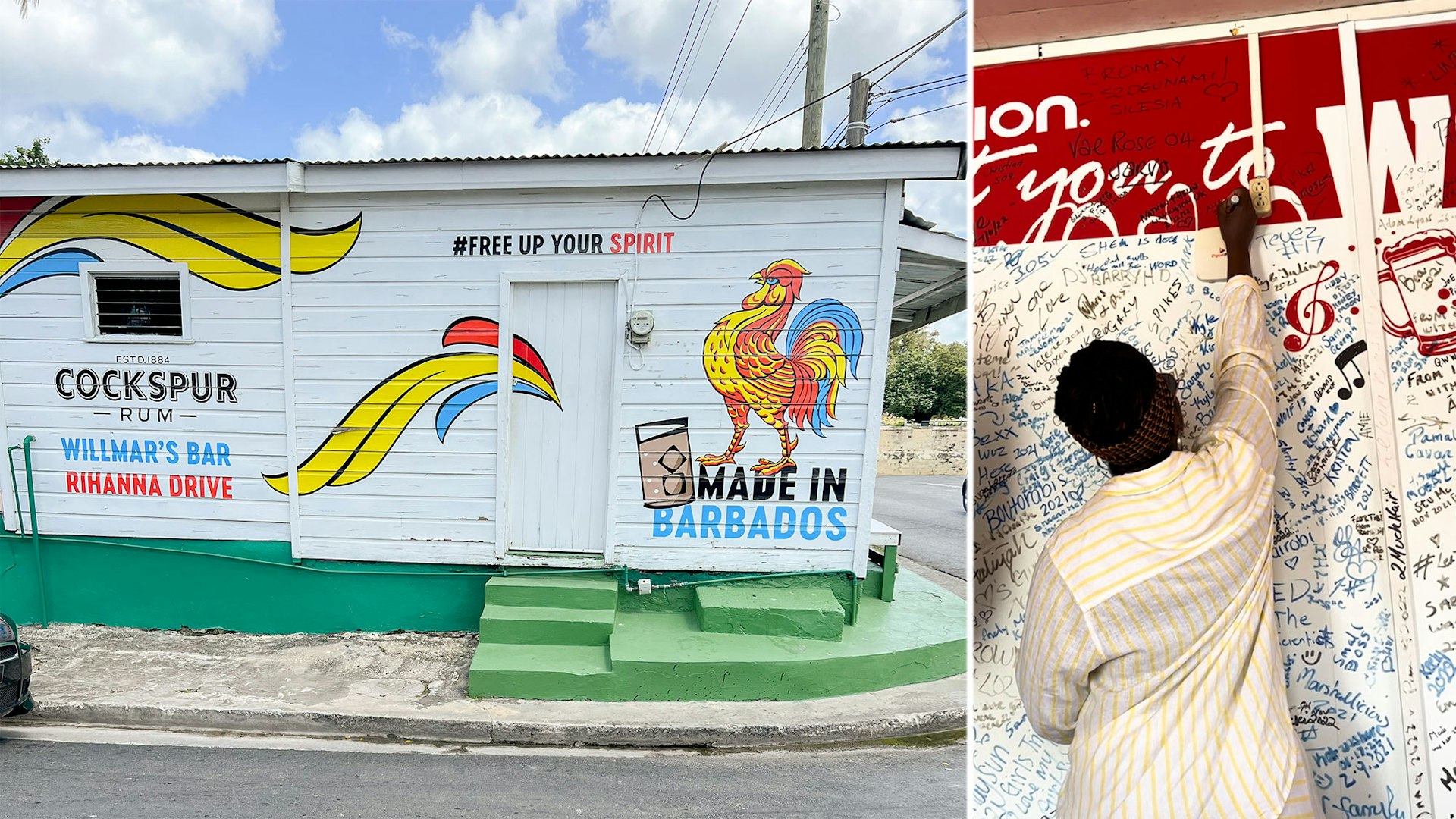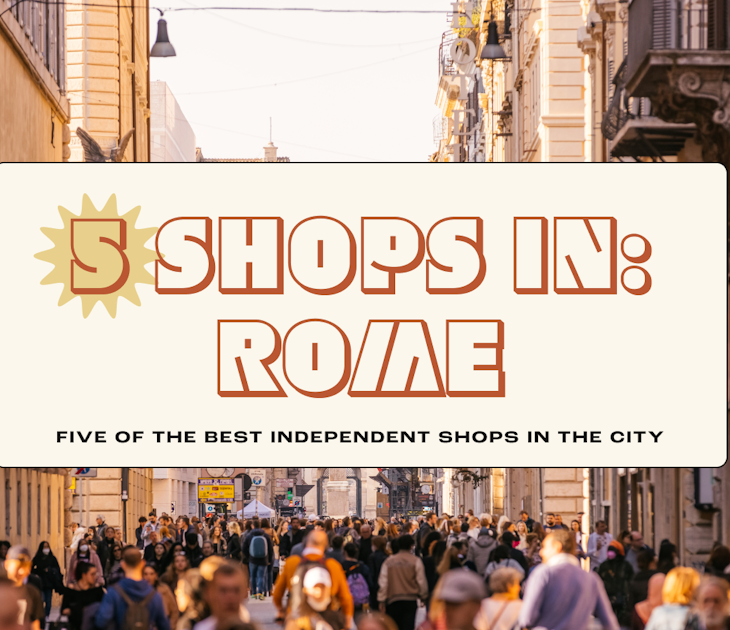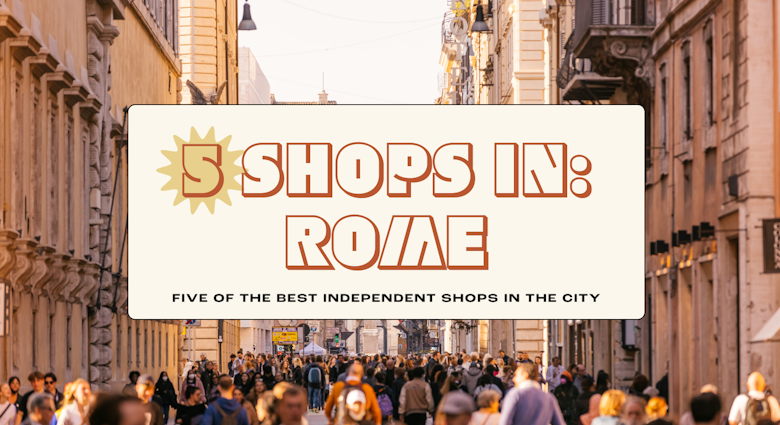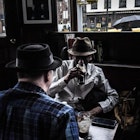Some girlfriends and I found ourselves in the north of Barbados, suddenly in desperate need of some painkillers. We’d been enjoying some girl talk and an afternoon island drive, with no destination in particular, when I was assaulted by a headache.
Now, something to know about Barbados is the further north you venture, modern conveniences — fast food joints, pharmacies, gas stations, even road signs — become fewer and farther between. So we did what any local would do: we rolled down the window and asked the first person we saw for the nearest rum shop.

Luckily (and unsurprisingly), it was just a bit further down the road. Fifteen minutes later we were back on our way, armed with a packet of Advil liquid gels, three cups of ice, some mints, a ginger ale, a cheese cutter (sandwich) for me and fried pork bites for the car. Ironically, no rum— this time at least.
Rum shops in Barbados are as ubiquitous as our palm trees. They’re a community staple, an easily accessible watering hole and a permanent, deeply relevant fixture in the local cultural landscape.
They aren’t quite a bar, nor are they a pub or a tavern. And while you can grab convenience items, some food stuff and other miscellaneous bits and bobs, they aren’t convenience stores or minimarts either. You can certainly enjoy many of our local delicacies there, but a rum shop is definitely not a restaurant.
Rum shops are their own genre of experience — casual, cozy and cultural — and your trip to Barbados won’t quite be complete without visiting one.

History of Barbados rum shops
To tell the story of Barbadian rum shops you must first tell the story of rum, the island’s most popular export (apart from Rihanna, of course!).
In the 17th century, Barbados, an island about half the size of New York City, was one of the world’s top sugar producers. The forced labor of an extensive enslaved population led to the Caribbean’s "sugar revolution," generating significant wealth as a colony of Great Britain.
Rum was subsequently developed as a by-product of sugar production. And historically speaking, Barbados can also lay claim to being the birthplace of the spirit as well.
The earliest mention of the word "rum" dates back to a lease agreement from 1650. Barbados is also home to the world’s oldest commercial rum distillery (and world’s oldest rum), Mount Gay rum.
As a colony, the island housed a significant British population, which led to the rise of the English “tippling house” – an establishment where men gathered to drink.
Since only overseas patrons or members of the plantocracy were allowed to frequent them, the rum shop emerged as an alternative for those who would have otherwise been excluded — working class folk, free Black people and so on.

When did Barbados rum shops become part of the culture?
Rum shops exploded in popularity, rapidly expanding alongside the local rum industry. In fact, at one point the lines between rum shop and rum producer began to blur, with some rum shop owners attempting to distill and sell their own rum.
Not only was this a huge no-no for the large-scale rum producers and merchants, the local government was also concerned about these homemade versions of the spirit, given that early versions of rum were certainly not as refined as they are today (back then, it was known by names such as "kill-devil" and as a "hot and hellish liquor").
Rum shops also had a bad rap as a place where the island’s perceived "undesirables" congregated and social ills thrived. And so the government passed various laws to limit the expansion of rum shops.
Unfortunately for them, rum shops were already deeply entrenched in the social fabric of the island, with an approximated one shop per 20 people on island.
Today, it’s estimated that there are over 1500 rum shops across Barbados — a significant number for an island with a population of under 300,000. The abundance of rum shops is only rivaled by the number of churches.
We like to say that for every one rum shop you spot, you’ll be sure to find a church in very quick succession. In fact, an alternative, totally unsubstantiated origin story alleges that rum shops were initially intended to give men somewhere to pass the time while their wives were at church.

What makes a rum shop different from a bar?
Rum shops are by no means hard to find. However, they are, by design, informal community-based establishments, which means you typically won’t be able to look one up on Instagram (although some you definitely can).
Rum shops also aren’t a monolith and run the gamut from tiny roadside shops to larger, more modern establishments. They tend to be brightly painted, open-air, rustic structures, with galvanized roofing. Many of them are attached to the owner’s home, though some contemporary ones are standalone buildings.
Sometimes the outside of the shop will be branded by a local alcohol producer. There will likely be some very casual outdoor seating — perhaps a picnic bench or high stools — and most certainly there’ll be a sign hanging near the entrance with the name of the shop.
It's very important to note that even though many rum shops will have “bar” in their name, they are, in fact, not bars — they’re rum shops. The biggest distinction between a bar and a typical Bajan rum shop is the way alcohol is served.
At a rum shop, if you want a rum and coke, you’ll purchase an entire flask or bottle of rum and a bottle or two of coke. The shop keeper will then hand you a bowl of ice along with your desired number of cups (the idea is to share), and you’ll mix the drink yourself.
Most rum shops will have a fully stocked bar with a range of liquors, but if you’re in the birthplace of rum and visiting a rum shop, I suggest you get the rum.
Community is at the heart of rum shop culture, given that many of them are located in local neighborhoods and serve people from the area. Expect to be surrounded almost entirely by locals on your rum shop jaunt. It’s a place many locals come to unwind after work, so be prepared to mix and mingle.

Now you try: here are some popular rum shops
If you’re looking for a rum shop, you probably won’t have to venture too far, but if you want to pencil a rum shop stop into your itinerary, here are a few that are particularly popular:
With a rum shop located basically around every corner, it’s not so much a question of where you’ll find the "best" but what kind of experience you’re looking for.
Often, rum shops assume the characteristics of their location and ownership, which means you can go to two different rum shops in the same day and have vastly different experiences.
For instance, if you ever visit Kermitt’s Bar located on the south of the island, you’ll find a bright green standalone shop that is well known for its happy hour specials, exciting karaoke nights and vibrant atmosphere.
On the other hand, if you were to head down to John Moore’s Bar on the west of the island, a mere stone’s throw away from a fresh fish market, you can expect a much more rustic shop, complete with stunning oceanfront views and chill, beachy vibes.
This means it would be nearly impossible to choose a “best” — and doing so might cause quite an uproar on what is an otherwise very laid-back island! — so just keep an open mind and enjoy your rum shop experience.

Take it with you
A bottle of Barbados rum is the ultimate souvenir (and hopefully, after a trip to Barbados, you’d have become a bit of a rum connoisseur). Many of our rums are exported around the world, so chances are you can find the rum back home, but it will be much cheaper if you grab it here before you leave.
Here are a few rums you can’t go wrong with, whether you plan to make your own rum punch at home or simply enjoy it on the rocks.
- Mount Gay Black Barrel – Bold taste with hints of black pepper, orange zest, toffee and toasted vanilla.
- Stade’s Rum – Gold rum infused with tobacco, cloves, ginger, cinnamon, dark chocolate and golden syrup.
- Doorly‘s 12 YO rum – Notes of chocolate and fruit.












